MOWGLI QUARTERLY



sd 01 MAGIC SCHOOL BUS THEME [PIANO PROJECT]
sd 02 ABC [THE JACKSON 5]
ff 03 FAST CAR [LUKE COMBS]
kr 04 WHAT A WONDERFUL WORLD [LOUIS ARMSTRONG]
ap 05 WIND BLOWN WALTZ [GIANT SAND]
DR 06 CHANGES [TUPAC]
sd 07 ALL YOU FASCISTS [BILLY BRAGG, WILCO]
ap 08 WHY I HATE SCHOOL BUT LOVE EDUCATION [SULI BREAKS]
DR 09 OOOH CHILD [THE FIVE STAIRSTEPS]
ff 10 AS IT WAS [HARRY STYLES]
AA 11 ANDREA [BAD BUNNY, BUSCABULLA]
hh 12 THE SUN [PORTUGAL. THE MAN]
AP 13 MY OLD SCHOOL [LULU]
sd 14 KELEN ATI LEEN [ORCHESTRA BAOBAB]
hh 15 IT WAS A GOOD DAY [ICE CUBE]
sd 16 READING RAINBOW THEME SONG [READING RAINBOW]
db 17 FLOWERS ARE RED [HARRY CHAPIN]
sd 18 BOOKS [PAUL WELLER]

sd 19 ORFEU [MOKINA, CARBEAU]

KR 20 LIGHT A CANDLE FOR PEACE [SHELLEY MURLEY]
sd 21 BABA O'RILEY [THE WHO]
SD 01 SESAME STREET THEME
SD 02 YOUNG FOLKS [PETER BJORN AND JOHN]
SD 03 WONDERFUL WORLD [OTIS REDDING]
hh 04 O CHILDREN [NICK CAVE & THE BAD SEEDS]
AA 05 ME VALE [MANÁ]
db 06 TEACH YOUR CHILDREN [CROSBY, STILLS, NASH & YOUNG]
dr 07 WHAT'S GOING ON [MARVIN GAYE]
hh 08 CHINESE FOUNTAIN [THE GROWLERS]
SD 09 READ ALL ABOUT IT, PT. ILL [EMELI SANDÉ]
SD 10 CHANGES - LIVE [DAVID BOWIE]
ap 11 EDUCATION [MODEST MOUSE]
ff 12 VACATION [DIRTY HEADS]
SD 13 IF YOU COULD READ MY MIND [GORDON LIGHTFOOT]
SD 14 YOUNG AREN'T YOUNG [THE HUNDRED IN THE HANDS]
dr 15 GANGSTA'S PARADISE [COOLIO]
ap 16 A CHILD'S QUESTION, AUGUST [PJ HARVEY]
ff 17 CRUEL SUMMER [TAYLOR SWIFT]
tb 18 WE NEED TO TALK ABOUT IT [BEN HARPER]
ff 19 SURRENDER - LIVE [CHEAP TRICK]
SD 20 XALE [WAU WAU COLLECTIF]
SD 21 GIMME SHELTER [MERRY CLAYTON]
I have a handful of hobbies I love to turn to for nurturing, grounding, expansion, and/or procrastination. Two of those hobbies (in theory) overlap » collecting books and reading books. I find great comfort in piles of books. The things I will learn, the ways my perspective will change, the places I'll escape to, the real-life anxiety that will leave my shoulders, even the way the beautifully-designed spine will look on a shelf when I finish reading it. Also, the things I may never learn or see differently or escape to, because I may never read them. The mere existence of being surrounded by potential inspires me, so their presence is healing. It's also why I really should separate out the hobby of collecting books and reading books.
What I am currently reading is Deschooling Society by Ivan Illich (thanks to a mention in Lisa B-K's newsletter of a different book by Illich). It's a different perspective to tie-in to everything we're discussing in this issue—from client love for Montessori School of C-U to banned books to DEI in school to turning a bus into a camper and learning outside of the education system via this thing called life. Illich painfully describes it in 1970 with,
The pupil is "schooled" to confuse teaching with learning, grade advancement with education, a diploma with competence, and fluency with the ability to say something new. Imagination is "schooled" to accept service in place of value. Medical treatment is mistaken for health care, social work for the improvement of community life, police protection for safety, military poise for national security, the rat race for productive work. Health, learning, dignity, independence, and creative endeavor are defined as little more than the performance of the institutions which claim to serve these ends...
Fiction became reality in 2020 for the entire world, and I like to think that version of a "group reading" led to learning... to grounding... to changing our perspectives on what is okay and what is not okay in our personal lives. I think that's why we're experiencing late stage capitalism so intensely now (at least I hope so).
Until then, thank you for reading/listening/watching, and please remember to enjoy this issue's mix tape (to the left) and podcast (tucked into page 08)!
ANNI POPPEN Owner/Artivist of Mowgli Studio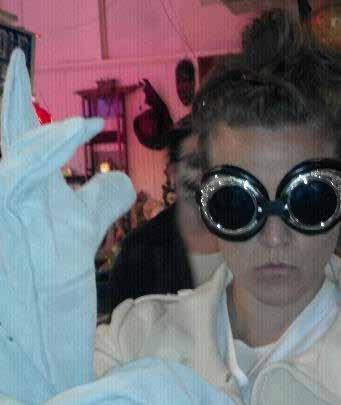 Pitbull Mama to Gertie & Vinnie Vegan at Keep On Vegan On Beadwork at Made by Mowgli Studio
Pitbull Mama to Gertie & Vinnie Vegan at Keep On Vegan On Beadwork at Made by Mowgli Studio
oooo, new adventure!

“Joy is the evidence of inner growth.”
—MARIA MONTESSORI
As a kid, I never felt like I lacked the ability to learn. I felt more like I lacked the right environment to learn in. My pace is different than others. My interests are different than others. My absolute anxiety to speak in front of the classroom was (still is) all-consuming. I could do everything everyone else was doing on my own, but the second I was asked to do it—I'd freeze. When I did fall behind (in math), my parents had me doing workbooks and extra homework after school. It worked. I ended up skipping a grade in math in high school, but somewhere in the middle of all of that I lost interest. If it weren't for the art and music programs, I would have wondered what the point of school was all together. I did what I had to do to keep up and keep my parents happy, but I now know I could have done so much more. Traditional education let me down.
As a young adult, I assumed Montessori was something run by nuns... in a monastery. Look, I already told you traditional education let me down—what did you expect? As an adult, I separated the two terms but never really took the time to learn what it was all about. I don't have kids nor did I have any friends with kids attending Montessori. It wasn't until I randomly met Kerry Rossow on a different project, That's What She Said, that I finally had the opportunity to learn more.
Be sure to check out MSCU's website for the nitty-gritty on the Montessori Method started by Maria Montessori in 1907, but the foundation of it is children are introduced to various types of “work”—appealing activities designed to foster cognitive, social, physical, and personal development. A Montessori classroom belongs to the children, not the adults, and the children learn to respect and care for themselves, each other, and the classroom through the guidance and example of the adults. Children choose the materials they work with as they are ready, at their own pace, rooted in their own interests, strengths, and curiosity. I learned this all over a decade ago, and yet I tear up a little bit when I read it. That's how much little Anni craved a space just like that. Hell, that's how much adult Anni does, too!
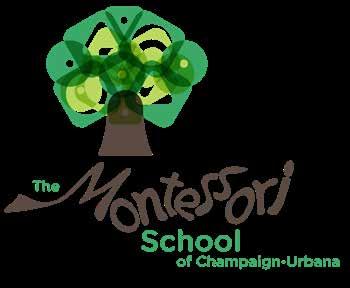
Kerry has been working in Montessori since 1994, and now is currently (I'm just learning this as I write it—so freaking proud of you Rossow) the Interim Head of School at The Montessori School of Champaign-Urbana. I asked what she thought of it all, and she said;
For 60 years, our Montessori School has been the home away from home for so many families. What an honor we have to provide a space where creativity, independence, critical thinking, collaboration, diversity, and community are valued. Our students not only master academic skills, but they also develop socially, emotionally, and ethically.
We now have multi-generational alumni. When a parent walks their own child to our doors, it is a special moment to be able to say, "Welcome home!"
To support MSCU's 60+ years of educating the community, you can donate at »
https://montessorischoolofcu.org/donate/
As I sit here reflecting on my experience working with children as an elementary school librarian, I think of all the small, big, challenging, and interesting (to say the least) moments that have made this job such a milestone in my life. Working in the library school systems, I have seen firsthand how library spaces can become secondary to schools. I have had multiple instances where the library is suddenly closed because the space is required for something else. Another event takes priority over students maintaining access to resources and learning... in a school! Ironic—isn’t it?
When a library's main reason of existing is to serve the students with the opportunity to discover and find passion for books, develop research skills, grow through responsibilities, learn from mistakes, and have a safe space to be themselves— placing a library on the back burner then communicates these things aren't important. Is that what we want to teach our students? You can imagine my disheartenment when book banning is stacked on top of that messaging.
Why ban books? How has that ever been helpful in the history of humanity? How does restricting information and discouraging freedom of thought —which undermines one of the primary functions of education—benefit anyone? Teaching students how to think for themselves is a bad thing? If children and adults no longer see characters struggling with the issues they are, or do not hear the voices that reflect their own, they will ultimately interpret their experience as negative, leaving them even more alone and isolated.
The new laws criminalizing librarians in states like Florida and Tennessee sounds like the prequel to Margaret Atwood's The Handmaid’s Tale. I, luckily, live in California, where librarians have yet to be criminalized for suggesting banned books. Though we still get our share of strongly opinionated individuals trying to dictate what we put out on the library shelves.
I was once approached about carrying Dr. Suess' books in the library. Some of Dr. Suess' older titles are out-dated at best, but what I have available are titles like The Cat in The Hat and One Fish, Two Fish, Red Fish, Blue Fish; nothing controversial. At the same time, my role isn't to make people comfortable but to have material available for those who want to explore further (this is one of the first things we’re taught in library school).
There have been other instances where the library is not respected within the school system. It is not seen as a “classroom” and librarians are not seen as “educators.” This is true (in the traditional sense), but it does not mean life-long skills are not being passed along.

Librarians and educators alike are not in charge of teaching right or wrong, that is something a parent or guardian should be instilling upon the child. I'm not saying there shouldn't be a curriculum incorporating ethics and morals, there should be. And I'm not saying it should be a free-for-all on materials; there definitely needs to be ageappropriate guidelines for literature. I'm saying libraries shouldn't participate in book banning or censorship. A library should be a place for kids to have the freedom to explore without being censored.
Libraries provide a community space to all students—from all economic, cultural, and social backgrounds. Librarians pass on life-long skills that help further education and gain access to community needs for all ages. I think I can speak for most librarians when I say we truly are trying our best to provide everyone with all the resources we can!
I can say, I am so thankful for the students who found their love for books and their voices, creativity, and sense of belonging by reading and the library. I become just as excited as they do when I finally get the new Diary of a Wimpy Kid graphic novel or a Babysitters Club book on the shelves. I look forward to putting on events such
“ Librarians save lives by handing the right time to a kid in
as the Book Fair and Battle of The Books and decorating the library for Women’s History Month, Hispanic/Latino Heritage Month, and other critical celebrations/experiences. Being a “Little Librarian,” as I call myself, is anything but little. I am happy and grateful I am here.
I hope you visit a library soon, read a good book and find something that makes your heart as happy as working in the library has made mine.
Fun Home BY ALISON BECHDEL
Of Mice and Men BY JOHN STEINBECK
The Handmaid's Tale BY MARGARET ATWOOD
Th1rteen R3asons Why BY JAY ASHER
Bless Me, Ultima BY RUDOLFO ANAYA
The Hate U Give BY ANGIE THOMAS
The Diary of a Young Girl BY ANNE FRANK
The Color Purple BY ALICE WALKER
The Catcher in the Rye BY J. D. SALINGER
I Know Why the Caged Bird Sings BY MAYA ANGELOU
EDITOR'S IF THIS THEN »
» The Teaching Role: Are Librarians Teachers?
» Pen.org #FreetheBooks campaign
» mychal3ts on TikTok
» Banned Books: A School Librarian's Perspective (Time article from 2000)
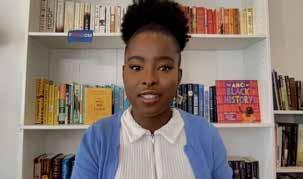
» The Authors Guild's Stop Book Bans Toolkit
» Banned books jigsaw puzzle
1984 BY GEORGE ORWELL
The Absolutely True Diary of a Part-Time Indian
 BY SHERMAN ALEXIE
BY SHERMAN ALEXIE
The Adventures of Huckleberry Finn/Tom Sawyer BY MARK TWAIN
The Kite Runner BY KHALED HOSSEINI
To Kill a Mockingbird BY HARPER LEE
Bone BY JEFF SMITH
Beloved/ The Bluest Eye BY TONI MORRISON
Brave New World BY ALDUS HUXLEY
Persepolis BY MARJANE SATRAPI
Ender's Game BY ORSON SCOTT CARD
The House of the Spirits BY ISABEL ALLENDE
The Perks of Being a Wallflower BY STEPHEN CHBOSKY
A Clockwork Orange BY ANTHONY BURGESS
Fahrenheit 451 BY RAY BRADBURY
Are You There God? It's Me, Margaret
BY JUDY BLUME
Slaughterhouse Five BY KURT VONNEGUT
In the Time of the Butterflies BY JULIA ALVAREZ
Charlotte's Web BY E. B. WHITE
The Lord of the Rings BY J. R. R. TOLKIEN
One Flew Over the Cuckoo's Nest BY KEN KESEY
The Call of the Wild BY JACK LONDON
In this episode, Anni sits back to learn with the listeners while David, Tony, and Delia discuss DEIB (Diversity, Equity, Inclusion, and Belonging) in different educational settings—homeschooling, K-12, and college levels.
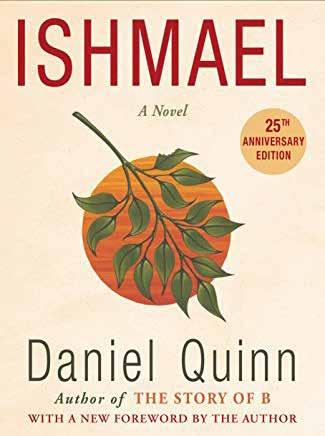 BY DANIEL QUINN
REVIEW BY HANNAH HOWELL
BY DANIEL QUINN
REVIEW BY HANNAH HOWELL
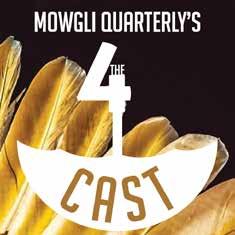
Have you ever heard someone say something and you think oh, wait, I knew that…? That’s what this book is. It’s that thought during every page.
The basics of this novel: 1) Ishmael is a gorilla who was captured in Africa, sent to a zoo in the states, and bought by a human who domesticated him— teaching him to read and communicate telepathically. 2) The narrator is unnamed, perhaps making him more relatable to the reader. When he was younger, he had wanted a teacher to tell him about the world, but it was always fraud after fraud, creating disappointment in anyone from then on claiming to have knowledge about the world. One day, he sees an ad in the newspaper - “Teacher seeks pupil. Must have an earnest desire to save the world. Apply in person.” 3) Ishmael is the teacher and the narrator becomes the pupil.
Ishmael uses Socratic dialogue to discuss modern society, including the past, present, and future. The idea of leavers versus takers (those who believe man belongs to the world versus those who believe the world belongs to man) is discussed. The idea that humans are unknowingly/knowingly imprisoned by a cultural story, a narrative they don’t know how to escape, a system that compels them to destroy the world all while thinking it’s the right way to live, but it’s all unsustainable is discussed. We, humans, are deep in this culture. So deep that the whole picture isn’t in focus. It takes a gorilla’s perspective, a primitive creature’s perspective, a leaver’s perspective to put this picture into focus.
As the reader, it’s all predominantly a-ha! moments. This book is full of teachings that, whether we knew we knew them or not, were there, buried inside our conscience, and we couldn’t articulate any of it. Thank you, Daniel Quinn, for eloquently bringing these thoughts to our attention, as they were forgotten.
I can’t help but think of The Overstory by Richard Powers. In a previous Mowgli issue, I wrote a review on this novel, and said “after reading, you are left with more appreciation for the world that we live in and on, for we are intruders of nature with a great lack of respect for it and the human hubris is killing our ability to cohabitate naturally.”
This idea has been around for decades. If it takes a gorilla explaining humans from an outside perspective for us to understand, so be it. “To err is human; to forgive, divine.” If nature can forgive us, maybe there’s hope.
REVIEW BY ALESIA ACEVES
(her first time reading a graphic novel!)
When you, the reader, picture a retelling of a Holocaust survivor's tale, you probably do not envision a story about a mouse interviewing his mouse dad, a holocaust survivor, do you? However, this is exactly what you find yourself faced with when you pick up the graphic novel memoir MAUS: A Survivor's Tale by Art Spiegelman.
This novel retells Spiegelman's late father, Vladek's, own experience of being Polish and Jewish during the time of the Holocaust in an interview-style graphic novel jumping back and forth between two timelines: the past and the present. Spiegelman adds a twist to the story by making the Jewish characters into mice (hence, the title being Maus, the German word for the word mouse), the Polish being pigs, the Germans being cats, and the Americans being dogs. I found the decision to make the characters into animals to be interesting. It adds a level of uniqueness that is appealing to readers who might not reach for memoir novels.
I thought Spiegelman's illustrations and storytelling for both Maus I and Maus II (also found combined into one book as The Complete Maus) did an excellent job retelling his father's story of immense struggles as a Holocaust survivor during these dark times in society's history. Spiegelman also does an excellent job of mapping out the scene for the reader through his illustrations while his father tells his story of going through the concentration camps. Further, the author did a great job depicting his
family dynamic and internal familyrelated struggles of father and son, which added more to the novel's overall plot.
Nevertheless, the content of this graphic novel can get dark and heavy at times due to the nature of the plot, touching upon topics of violence, death, and suicide (I even found myself putting the novel down a few times to process what was going on). Still, there are moments of lightheartedness throughout the story.
Overall, I found Maus to be a great graphic novel and an even greater first graphic novel to have read.
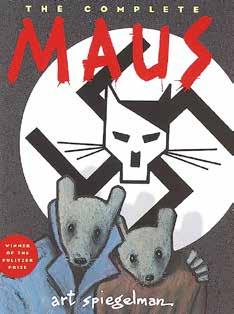
As a former classroom teacher, one thing I know for sure is what goes on outside the classroom impacts learning as much (if not more than) as what goes on inside the classroom. Which is partly why the two words that I often think of when I think of educational success are access and support. One gets us in the room; the other helps us thrive once we are there.
» The Complete Persepolis
» Palestine
» Fun Home
» Drama
» Animal Farm
THE QUARTERLY WILL HAVE TWO ISSUES IN 2024 FEATURING AGE-SPECIFIC WRITERS AND EDITORS (21+YOUNGER AND 70+). DO YOU (OR SOMEONE YOU KNOW) WANT TO JOIN IN ON THE ACTION, BUT JUST FOR ONE ISSUE? PLEASE EMAIL ME AT ANNI@MOWGLISTUDIO.COM, WE'D LOVE TO HAVE YOU!
Zufan Gevre’s film, Fourteen Ninety, has nothing to do with education—which is why it has everything to do with education. Ari gets her first period, and the onset of the demarcation is confusing, scary, momentous, and calls forth the full array of human emotions. Much has been said about the starting of a woman’s period, and I am not an authority to speak on the topic. That said, significant milestones, particularly in a young person’s life, can be (at best) tricky to navigate. Though Ari has access; she has no support.
If she is allowed to experience getting her period alone, what else is she left to navigate alone? How does this impact her access and support to education? One of the few democratic ways left to rise above the station in life in which we are born.
Explore Ari's journey and remember: every student has at least one place where adults have let them down and those without access and support must fight hard longer to thrive.

They're both educators... they flipped a school bus into a camper... Their last name is Fish... Skoolie of Fish. I can't make this up—it's simply brilliant! Go follow them on Instagram, don't worry, I'll wait... <plays hold muzak of Girl from Ipanema>


I lucked out in the neighbor department, 100%. On the North side of my house lives a retired couple who share gardening tips, their favorite contractors from over the years, life experiences, and the occasional glass of wine. West of me, serendipitously, a friend I hadn't seen since 8th grade moved in and she's still one of my favorite people all these years later. On the South side is the Fish family.
Chris Fish was the first person I met in the neighborhood, as he came out the front door to introduce himself while I was moving in. Chris and Karen married shortly after I moved in, and I still remember Karen leaving me one of their wedding peonies in a tiny mason jar at the front door. When they had their first baby, Parker, he quickly wiggled his way into my heart and will forever stay there as my little buddy. Their second kiddo, Myles, is doing just the same.
When 2020 rolled around, I learned I shared a dream with Chris and Karen... flipping a vehicle into a camper and going out on adventures. Needless to say, I've been living vicariously through them for the last few years. At least my 10 plus years of research on the topic has, maybe a couple of times, been useful when brainstorming challenges as they worked on the bus.
But let's get to the good stuff! After both of us watching hundreds of van and bus tours, we got together and filmed a tour of their bus. It has so many nuggets of goodness, check it out! »»»»»

MIX TAPE CONTRIBUTORS (arranged by SD)
AA (alesia aceves)
AP (anni poppen)
FF (chris, karen, parker, and myles fish)
DB (david bradburn)

DR (delia rodriguez)
HH (hannah howell)
KR (kerry rossow)
SD (scott durfor)
TB (tony bradburn)
PHOTOGRAPHY + VIDEOGRAPHY
cover/spotify (pexels/gül işık) letter from me (jafe weems)
client love (montessori school of c-u) design » on the inside (mowgli studio video) roll credits (pexels/cottonbro studio)
DON'T WANT TO MISS THE NEXT ISSUE OF MQ?
Subscribe [right here]! I promise I won't email you except for the four issues per year. Gotta love an email signup that promises that!
IF YOU'RE WITH A NON-PROFIT + WANT TO COLLABORATE

Please email me at anni@mowglistudio.com to schedule a chat!
IF YOU WANT TO SUPPORT OUR WORK
Check out that coffee cup icon below or our affiliate links to share the perks